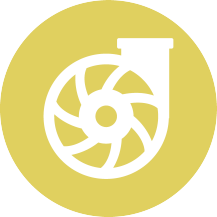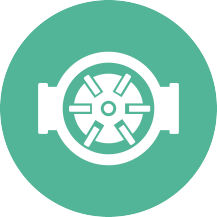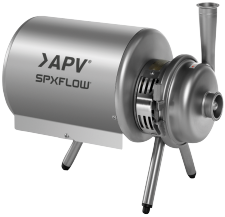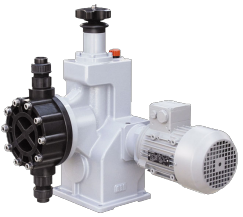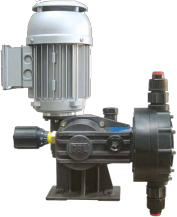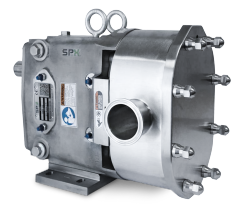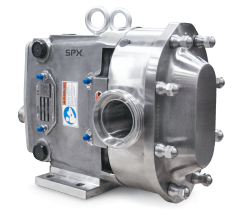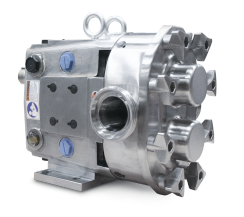Are you using the right pumps or just the ones you have always used? Pumps play a crucial part in each production process. The right choice of a pump matters to productivity, profitability, reliability and safety of the entire process. Therefore we will always ask at first; what are you pumping?



Pumps
Industrial pumps
Industrial pumps are an essential component of many industries, providing a reliable and efficient means of transferring liquids and gases from one area to another. They are designed to meet the specific needs of each application, from handling corrosive liquids and aggressive fluids to pressurizing and transferring both liquids and gases. Industrial pumps are used in areas and industries such as power generation, oil and gas, water and wastewater treatment, mining, chemical processing and food and beverage production. Industrial pumps can be divided into two main types: positive displacement pumps and centrifugal pumps. Each type of pump has its own advantages and disadvantages, making it important to select the appropriate type for the specific needs of the application.
Positive displacement pumps
Positive displacement pumps are a type of mechanical pump that utilize the principle of enlarging (priming) and reducing (squeezing) the space in the pump housing to generate a constant volume displacement. This displacement is (approximately) directly proportional to the speed of the pump, meaning that the delivery (flow rate) of the pump is independent of the delivery pressure. In positive displacement pumps, a predetermined amount of fluid is moved with each cycle. The maximum head pressure is primarily limited by the mechanical strength of the pump.
Centrifugal pumps
Centrifugal pumps are the collective name for pumps that use centrifugal force to transfer liquids from one location to another by creating a vacuum. In its simplest form, a centrifugal pump typically consists of a rotating impeller with blades, housed in a pump casing. The suction line is connected to the central inlet of the pump casing, and the pressure line is connected to the outer circumference. When the impeller rotates, the centrifugal force causes the liquid to be propelled from the center to the outer periphery.
Pump types and their applications
- Hygienic rotary piston pumps can, among other things, pump cold and viscous substances, such as butter, with few dead spaces for easy cleaning.
- Rotary lobe pumps with food certificates are ideal for pumping yogurt with large delivery chambers, preventing damage to delicate ingredients like strawberries.
- Self-priming peristaltic pumps are often used in breweries to pump mash and meter diatomaceous earth in filtration processes.
- Self-priming air-operated diaphragm pumps are designed to pump water containing sand and other dirt particles without relying on an external power source.
- Eccentric screw pumps are used in water treatment, chemical, and food industry processes to convey abrasive liquids with high solids content.
- Metering pumps can inject chemicals into the process under high pressure, making them ideal for use in refineries and large chemical plants.
- Heavy-duty gear pumps are designed to handle media with high viscosity and temperature, making them ideal for pumping tar and asphalt.
Find the right industrial pump for your needs
AxFlow offers industrial pumps and accessories for a wide range of industries and applications. Do you need support in selecting the right pump for your needs? Do not hesitate to get in touch. AxFlow’s experts and engineers can provide guidance for selecting, specifying, installing, and maintaining your industrial pump.
102 series from 18 manufacturers
-
- Acetate
- Adhesives
- Agriculture
- Aviation
- Bakery and confectionery
- Beauty & Personal Care
- Brewing and beverages
- Building Services
- Ceramics
- Chemical
- Clay
- Confectionery
- Convenience food
- Dairy
- Detergents
- Distilleries
- Drinking Water
- Dye & Pigment
- Emulsions
- Fertilizers
- Fish Farming
- Flood Defence
- Food & Beverage
- Fruit Concentrates
- Gas terminals
- Heating, Water & Sanitation
- Meat Processing
- Mechanical Engineering
- Mining
- Nuclear Power Plants
- Offshore
- Oil & Gas
- Oil Fats & Mayonnaise
- Paint & Surface Coating
- Paints & Resins
- Paper Mills
- Pet Food
- Petrochemical
- Pharmaceutical
- Plastic
- Power Generation
- Refineries
- Research & Development
- Sugar Processing
- Surface / Pit
- Surface Finishing
- Textile
- Transportation
- Wastewater
- Water Treatment
- Wood Processing
-
- Analysis
- Booster
- Circulation
- Cleaning
- Control
- Conveying
- Cooling
- Descaling
- Desinfection
- Dewatering
- Diagnostic
- Discharge
- Distribution
- Dosing
- Drain
- Drainage
- Dredging
- Dual Dispensing
- Extraction
- Feed
- Filling
- Filtration
- Flow Control
- Greasing
- Grinding
- Handling
- Heating
- High-Pressure
- High-Temperature
- High-Volume
- Injection
- Irrigation
- Level Control
- Lift
- Lifting
- Loading
- Low-Pressure
- Lubrication
- Medium-Pressure
- Metering
- Mixing
- Off-loading
- Powder Coating
- Pressurisation
- Process
- Processing
- Recirculation
- Recovery
- Refueling
- Replacement
- Rinsing
- Sampling
- Settling
- Spraying
- Tempering
- Transfer
- Treatment
- Unloading
- Volumetric Dispensing
- Washing
- Water-Jet Cleaning
- Water-Jet Cutting
-
- Abrasive Liquids
- Acetate
- Acids
- Adhesives
- Alcohols
- Aluminium Oxide Slurry
- Ammonia
- Beer
- Biological Broths and Slurries
- Bitumen
- Carbon Fibers
- Caustic Solutions
- Cereals
- China Clay Slurry
- Chocolate
- CIP Fluids
- Clay
- Coffee
- Concrete
- Cooling Water
- Corrosive Dyes
- Corrosive Liquids
- Cryogenic Liquids
- Crystalline Slurry
- Dairy Products
- Detergents
- Diesel Fuel Oil
- Drinking Water
- Dye Pigment
- Emulsions
- Ethylene Glycol
- Ferric Chloride
- Fertilizers
- Foam Protein
- Fruit and Vegetables
- Fruit Concentrates
- Gels
- Glycol
- High Temperature Oils
- High Viscosity Liquids
- Hydrochloric Acid
- Hygienic Liquids
- Irrigation Water
- Lake Water
- Latex
- Light Fluids
- Lime
- Liquid CO2
- Low NPSH
- Low Viscosity Liquids
- LPG
- Meat
- Milk
- Molasses and Syrups
- Must
- Non-Newtonian Fluids
- Oil, Fats and Mayonnaise
- Paints
- Paints Resins
- Personal Care Products
- Pet Food
- Phosphoric Acid
- Plastic
- Process Condensate
- Produced Water
- Radio Active Fluids
- Redox
- Refrigerants
- Rubber
- Sauces
- Seawater
- Sensitive and Viscous Fluids
- Separated Oil Processing
- Sewage
- Silver Nitrate
- Soaps and Detergents
- Solids and Abrasives
- Solvents
- Spirits
- Sulphuric Acids
- Surface Water
- Surfactants
- Synthetic Fibers
- Thermal Oil
- Thin Liquids
- Thixotropic Fluids
- Toluene
- Toxic Liquids
- Ultra Pure Water
- Vegetable Oils
- Vinegar
- Viscose
- Viscous Liquids
- Wastewater
- Water
- Water Hardness
- Wine
- Wort
-
- Abrasion Resistant
- Adjustable-Flow
- Aseptic
- Automatic
- Booster Sets
- Canned
- Chemically Resistant
- CIP
- Close-Coupled
- Compact
- Containment
- Corrosion-Proof
- Direct-Drive
- Double-Acting
- Electric
- Explosion-Proof
- Fish Friendly
- Flange
- Heavy-Duty
- High System Pressure
- High Temperature
- High-Efficiency
- High-Flow
- High-Performance
- Horizontal Mount
- In-Line
- Intrinsically Safe
- Low Shear
- Low-Noise
- Magnetic Drive
- Mechanical
- Mechanical Seal
- Mixed Flow
- Mobile
- Modular
- Motorless
- Multi-Stage
- Non-Metal
- Oil-Free
- Pulse-less
- Rotary
- Rugged
- Sanitary
- Seal-less
- Self-priming
- Semi Submersible
- Single-Stage
- SIP
- Solids Handling
- Variable Speed
- Vertical
- Vertical-Mount
Do you need help finding the right pump that meets your needs?
We have experienced experts who are reay to help you!
Get in touch here
